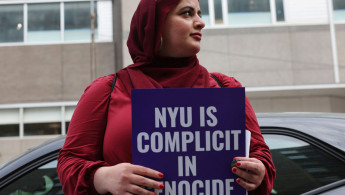Activists warn US universities' new student codes of conduct could be used in 'crackdown on pro-Palestine activism'
Pro-Palestine activists are concerned that a new code of conduct introduced by some US universities for students could be used to target acts of protest against the war on Gaza.
An updated code of conduct for students at New York University (NYU) to combat bigotry on campus states that speech and conduct targeting "Zionists" can now violate the school’s non-discrimination rules as Zionism, in the university's eyes, can be a "code word" for Jewish.
The Non-Discrimination Anti-Harassment Policy (NDAH) states that "using code words such as 'Zionist' does not eliminate the possibility that your speech violates NDAH policy".
The document defines discrimination as "adverse treatment based on an actual or perceived characteristic", referring to the "use or dissemination of tropes about protected groups" adding that "for many Jewish people, Zionism is a part of their Jewish identity".
There is also a section on protest activity, stating that protesting off campus does not "immunise" students from disciplinary action.
‘A dangerous precedent’
The policy was slammed by activists who believe it implies that any nationalist political ideology should be entitled to civil protection.
"The new guidance sets a dangerous precedent by extending Title VI protections to anyone who adheres to Zionism, a nationalist political ideology, and troublingly equates criticism of Zionism with discrimination against Jewish people," the NYU chapter of Faculty and Staff for Justice in Palestine said in a statement.
They also called it a "disturbing development" that would "legitimise far-right and ethnonationalist ideologies under the guise of protecting students from racial discrimination".
The updated policy comes as NYU’s new semester is set to start next week, following pro-Palestine protests demanding a ceasefire in Gaza throughout the last academic year.
Protesters demanded an immediate ceasefire and called on the university to cease all its investments in companies that profit or have links to Israel’s ongoing war on Gaza.
Palestine Legal, an independent organisation which protects the rights of people in the US, said the policy could risk creating a hostile environment for Palestinian and anti-Zionist Jewish students.
"The policy directly conflates Zionism and Judaism by stating the former is a ‘code word’ for the latter. It goes on to treat Zionism as a protected class on its own – a status afforded to no other political ideology," the organisation said in a statement.
Restricting student protests
Other universities across the US have made policy changes or taken action regarding protests.
Indiana University said as part of its "expressive activity" policy now bans protests within 25 feet (7.6 metres) of university buildings or any protests that block buildings, facilities, driveways or parking lots.
Vanderbilt University is banning all protests that "require individuals to sleep or gather overnight", University of Connecticut as well as encampments and tools used to amplify sound at gatherings. The University of Virginia is also banning tents on campus without prior approval from authorities.
The University of California enforced a ban on encampments and use of face masks last week in response to the pro-Gaza protests.
President of UC, Michael V Drake, claimed in a statement that the university was taking heavy-handed measures to ensure "a safe, inclusive campus climate that fosters a free exchange of ideas".
"Freedom to express diverse viewpoints is fundamental to the mission of the University, and lawful protests play a pivotal role in that process," the statement said.
"While the vast majority of protests held on our campuses are peaceful and nonviolent, some of the activities we saw this past year were not."
The statement said that stricter policies will be enforced ahead of the new academic year, banning encampments and people on campuses from concealing their identities.





 Follow the Middle East's top stories in English at The New Arab on Google News
Follow the Middle East's top stories in English at The New Arab on Google News
![MP Essam Diab's pursuit to block TikTok in Egypt has revived an already ongoing debate in the country. [Getty]](/sites/default/files/styles/image_330x185/public/1230748046.jpeg?h=a5f2f23a&itok=-8MqBLLC)

